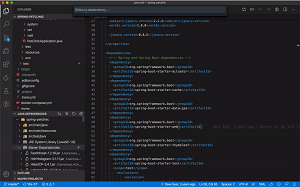News
Visual Studio Code Boosts Java Dependency Viewer
Easier management of project code dependencies and improvements to extensions for popular Java frameworks and runtimes highlight the February update to Java in Visual Studio Code functionality.
Java tooling is provided through various VS Code extensions, which can be downloaded together with the Java Pack Installer from Microsoft's Java in Visual Studio Code page.
The February update focuses on helping developers wrangle dependencies and Java Development Kits (JDKs), among other improvements.
"Whether your use any build tool or not, Java Dependency Viewer now provides you an easy way to deal with your dependencies," said Xiaokai He, senior program manager for Java on Visual Studio Code and Azure, in a Feb. 19 blog post.
 [Click on image for larger, animated GIF view.] Java Dependency Viewer in Animated Action (source:Microsoft).
[Click on image for larger, animated GIF view.] Java Dependency Viewer in Animated Action (source:Microsoft).
For example, developers can click a "+" button to quickly add a dependency to projects using the Maven build automation tool, while the experience for referencing binary jars in a local file system in projects not using build tools like Maven and Gradle is similar.
For developers having to deal with multiple Java runtimes, the update introduces a new preference mapping java.configuration.runtimes for Java execution environments in order to configure local JDK runtimes. The code editor automatically detects the runtime required for your project and chooses the appropriate configuration.
Those aforementioned extensions that supply Java functionality in the open-source, cross-platform editor also received their own improvements.
"If you're working with popular Java Frameworks such as Spring Boot and MicroProfile, Visual Studio Code has you covered as well," He said. "Below are some exciting new capabilities now available with those extensions
Other improvements include new code actions, a debugger tweak that adds a context menu to control other threads, and more.
About the Author
David Ramel is an editor and writer at Converge 360.